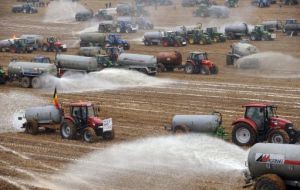MercoPress. South Atlantic News Agency
Chilean dairy farmers call for protection from Argentine imports
 In Europe dairy farmers are also furious and dumped 3 million liters of fresh milk on pastures and roads (Photo AFP)
In Europe dairy farmers are also furious and dumped 3 million liters of fresh milk on pastures and roads (Photo AFP) Chilean dairy farmers requested President Michelle Bachelet to speed the implementation of the provisional safeguard clause to help contain the import of Argentine powder milk and cheese. The safeguard clause means imposing a 31% tariff on dairy imports.
According to Chilean farmers Argentine imports of skinned and whole powder milk and Gouda cheese have had a great impact on the sector, mainly for small and medium sized farmers who represent 80% of milk producers.
“The provisional safeguard could be particularly non effective if its implementation continues to be delayed”, said Dieter Konow, president of Fedeleche in an open letter to the Chilean leader Bachelet.
“I’m addressing you in representation of the 13.000 milk producers which make up our sector to request your special support and resolution for the urgent implementation of this contingency measure”, said the letter.
According to procedure the safeguard clause works in parallel with the investigation undertaken by the Commission on Market Distortions, which was launched last August.
Meantime in Europe protesting milk farmers dumped three million liters of fresh milk onto pastures and roads in a massive, organized protest against lowered dairy prices.
In Belgium, farmers spread milk across roads near the southern town of Ciney. Elsewhere, about 300 tractors dragged milk containers through plowed fields in southern Belgium, dumping a day's worth of milk production in that region.
“It is a scandal to dump this, but we have to realize what the situation is,” said Belgian farm leader Erwin Schoepges. “We need a farm revolt.”
Milk farmers say world prices have gone so low that they had to sell at half the production cost, leaving more farmers unable to pay their bills.
Prices have fallen 40 per cent since the spring, and European dairy farms are set to lose the equivalent of 14 billion US dollars this year unless the situation is remedied.
On Tuesday, farmers closed Belgian border crossings to the Netherlands and to Germany to push demands for higher prices. Most EU nations want to shore up milk prices but they disagree on how to do that. The EU head office opposes a lowering of quotas, but the quotas are scheduled to end in 2015.




Top Comments
Disclaimer & comment rulesCommenting for this story is now closed.
If you have a Facebook account, become a fan and comment on our Facebook Page!